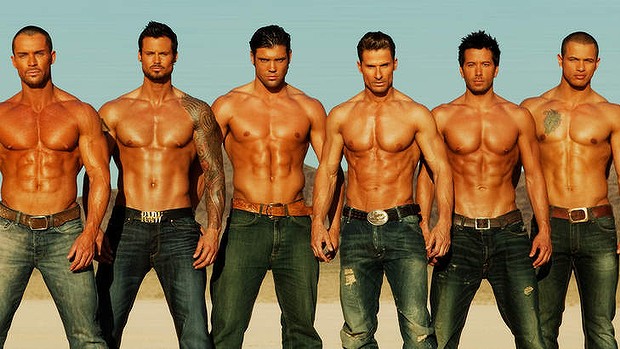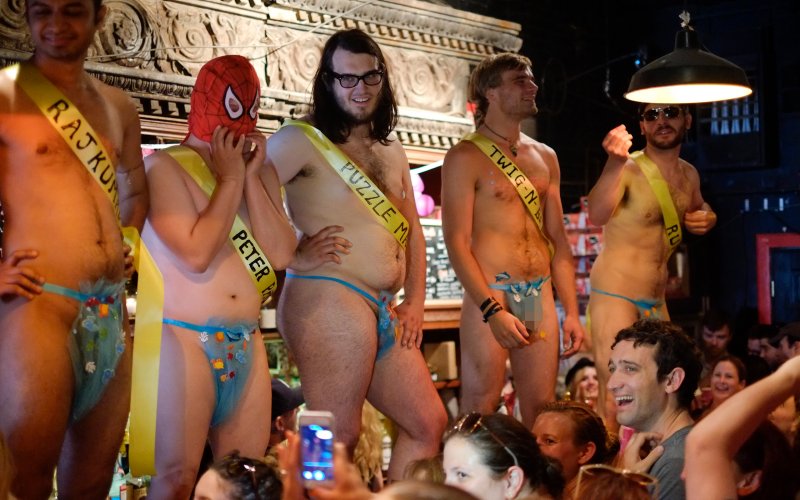[NSFW] Photos: Smallest Penis In Brooklyn Contest Returns With Bigger Crowds, Bigger Penises
As promised, the Smallest Penis in Brooklyn pageant made its return to the borough this weekend, with five new penises and the bodies attached to them vying for the coveted title. For a few stifling hours, Bushwick's Kings County Bar transformed into one giant bachelorette party—assuming that party was held on the 4 train during rush hour, because that's how mobbed this bar was, with everyone and their mother (there were a few mothers there) anxious to see all the teeny peen.
The madness kicked off around 2 p.m., when a block-long line started trickling in—word on the street was that the first ladies in line had been there since 11:30 a.m. The bar was bedecked with penis-related balloons, streamers and decor. Bartenders were serving up a special "Penis Colada" drink: a creamy, white concoction that by no coincidence looked like semen, and came with a penis-shaped straw to boot. By 3 p.m., you couldn't move a muscle in the joint, but it was time for the festivities to start. The judges—broadcaster Carolyn Fox, sex educator Kendall McKenzie and bar owner Aimee Arciuolo—took their seats. Uproarious drag queen Chicken Bitches, donning a fur coat and ferocious blonde wig, was back to reprise her role as Master of Ceremonies, introducing the contestants.
A block long line for smallest penis contest. pic.twitter.com/GxdsIfNSk2
— Zee Y (@ZeeLoveGeeks) June 14, 2014
Now for the micro penises. There were five contestants this year: the Puzzle Master, Rufio, Rajkumar, Twig 'n Berries and Spiderman mask-wearing Peter Parker, who was a contestant last year, albeit under a different name. Rip Van Dinkle, who was a star sensation at last year's competition, was unable to make it this year thanks to travel woes, according to his Facebook. The contestants were introduced to the audience via a question-and-answer session, where Rajkumar instantly won the crowd's (and judges') hearts by singing and dancing to an Indian song and telling the crowd he liked "kissing" in bed.
And though this was a tiny penis competition, it was pretty clear from the get-go that both Rufio and Twig 'n Berries had perfectly average-sized penises. "Your dick is too fucking big," judge Fox told Rufio, before slamming him with a poor score. Note that the penises were covered with decorative toilet paper. "Because of legal regulations, we cannot show you the dick," Chicken Bitches advised us.
Post-Q&A came the swimsuit competition. The fellers lined up on top of the bar, junk camouflaged with aqua-colored cloth covered with sea creatures (like crabs!). There, they were sprayed with water by Super-Soaker wielding bar staff, and urged to dance for the crowd. Once again Rajkumar came out the winner. Once again, Rufio's normal-sized penis earned shame from the judges. "That looks like a big ol' dick," one judge yelled at him. At this point, the bar was so packed I had to find sanctuary up against a garbage can in the corner, for fear of getting trampled by a team of squealing, micro penis fetishists.
Today there was a "Smallest Penis In Brooklyn" contest. And that's all you need to know.
— Coffee and Cupcakes (@stridestruggles) June 15, 2014
Contestants had a real chance to shine during the talent section. The Puzzle Master reenacted Buffalo Bill's "Would You Fuck Me? I'd Fuck Me" scene from Silence of the Lambs, before dropping trou and treating the crowd to a view of his tucked-away junk. Rufio told terrible jokes. "What's the difference between a penis and a bonus? Your wife will always blow the bonus." He was appropriately vilified by the judges and Chicken Bitches, who had emerged as the hero of the night.
Crowd favorite Rajkumar treated us to a full-throttle Bollywood dance, and Peter Parker rocked out to "Jump On It." Twig 'n Berries delved into a rendition of Monty Python's "The Lumberjack Song," before taking his pants off and titillating the crowd with a rare full-frontal (and not small, the cheater!) penis sighting.
Finally, there was the crowning. The contestants wore tiny tuxedos over their penises in celebration. Last year's winner, Nick Gilronan, was there to hand off the title, telling the crowd that his life hadn't changed too much since he crushed last year's competition, but he did get laid a couple times this year. Rufio and Twig 'n Berries were tossed from the top three, due to their attempt to sneak regular-sized penises into a small penis competition. Briefly, a horrific sewage smell spread through the bar, and many attendees fled for fresher air, finally alleviating some of the claustrophobia.
Ultimately, Rajkumar was proclaimed the winner, landing $200 in cash, a date out in Bushwick with two sisters, and a place in Small Penis history.
Rajkumar lives in Manhattan, but moved here from India by way of Bloomington, Indiana after winning a Fulbright. He says having a small penis has never stopped him from finding romance. "I have enough fun with women," he told us, noting that ladies never complained about his size. "It's okay, from whatever to whatever. You are what you are." After all, Gupta says, true love has nothing to do with your disco stick. "Penis size is of the least importance," he said. "Most important is love and devotion. It's all about love." Gupta plans to make a film about his journey from India to Indiana, and hopefully his Smallest Penis title will earn a mention. "I really believe it's going to be a blockbuster," he said.
And so concludes our commentary on the Great Small Penis Shitshow of 2014. A few notes: Kings County Bar will be moving a few blocks away at the end of this month, and Arciulo promises the space is much bigger than the current incarnation, which will hopefully alleviate some of the miserable crowding that crushed this year's show, should you choose to attend. Also, between competitions, music comedy duo Afterbirth Monkey treated attendees to some excellent penis-themed music, stealing the show from all the actual penises. I'd pay $5 to see them again, if not the scrotum.











